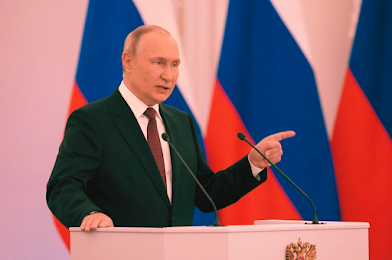The Legacy of Vladimir Putin: A Controversial Figure in Russian Politics
Vladimir Putin is a prominent Russian politician who has been in power for over two decades. He served as President of Russia from 2000 to 2008, then as Prime Minister from 2008 to 2012, and finally as President again since 2012. Putin is a controversial figure, admired by some and criticized by others. In this blog post, we will take a closer look at Putin's background, his rise to power, and his legacy.
Background
Putin was born in Leningrad (now St. Petersburg) in 1952. He graduated from Leningrad State University in 1975 and joined the Soviet Union's security agency, the KGB, where he worked as a foreign intelligence officer for 16 years. In 1991, joined politics, working as the advisor of mayor in St. Petersburg. In 1996, he moved to Moscow and became the deputy chief of presidential staff for Boris Yeltsin.
Rise to Power
In 1999, Yeltsin appointed Putin as Prime Minister of Russia, and when Yeltsin resigned on December 31 of the same year, Putin became the acting President. He won the presidential election in 2000 and was re-elected in 2004. Putin's presidency was marked by his efforts to strengthen the Russian state and restore its status as a major world power. He pursued policies to stabilize the economy, combat corruption, and strengthen law and order.
Putin's Legacy
Putin's legacy is mixed. Supporters credit him with stabilizing the Russian economy and restoring national pride, while critics accuse him of suppressing dissent, curtailing freedom of the press, and consolidating authoritarian rule. Putin's policies have led to increased tensions with the West, particularly over the annexation of Crimea in 2014 and Russia's involvement in the conflict in eastern Ukraine. In recent years, Russia has also been accused of interfering in the 2016 US presidential election and other democratic processes in the West.
Putin's foreign policy has been characterized by a desire to reassert Russia's influence on the world stage. He has pursued closer ties with China, and he has been a vocal critic of the US and NATO. Russia's military intervention in Syria has been seen as an attempt to project power and influence in the Middle East.
Conclusion
In conclusion, Putin is a complex figure whose legacy will be debated for years to come. While he has presided over a period of stability and economic growth in Russia, his authoritarian tendencies and aggressive foreign policy have led to tensions with the West. Putin's legacy will likely be shaped by how Russia develops in the years to come, and how its relationship with the rest of the world evolves.











No comments: